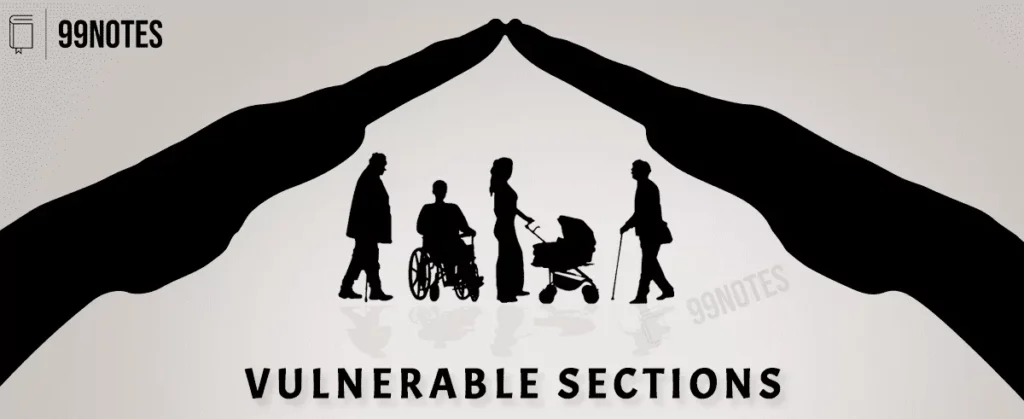
Vulnerable Section Free UPSC Notes Download
More About Vulnerable Sections
Vulnerable Sections refer to disadvantaged or marginalized groups in society, such as Dalits (formerly known as “untouchables”), tribals, and minorities.
Understanding the challenges and issues faced by these groups is crucial for designing and implementing policies and programs that address their needs and promote their well-being. This can help reduce poverty and inequality and contribute to the overall development of the country.
In addition, the Constitution of India provides special protections and provisions for vulnerable sections, such as reserved quotas in education and employment, and it is important for civil servants to be aware of these provisions and how they are implemented.
Furthermore, the topic of vulnerable sections is also relevant for understanding the diversity and complexity of Indian society and for promoting inclusivity and equality. It is essential for civil servants to have a nuanced understanding of the challenges and opportunities facing different groups in the country, and to be able to work towards creating a more equitable society.
Mechanisms to safeguard the interests of disadvantaged groups:
- Various clauses in the Constitution protect the interests of vulnerable groups.
- Legislative: Federal and State: Several bills for disadvantaged groups.
- Various Ministries within the Central and State Governments.
- The judiciary is responsible for delivering social justice.
- Administrative Decentralization (extending to Panchayati Raj Level to reach vulnerable sections).
- National and state commissions for disadvantaged groups (Like National Commission for Women).
Vulnerable sections refer to disadvantaged or marginalized groups in society that may face challenges in accessing basic rights and opportunities, such as education, healthcare, employment, and political representation. In India, vulnerable sections include Dalits (formerly known as “untouchables”), tribals, and minorities.
Dalits, also known as Scheduled Castes, are a historically disadvantaged group that has faced discrimination and marginalization due to the caste system. Despite legal protections and affirmative action policies, Dalits continue to face widespread social and economic exclusion, including limited access to education and employment opportunities.
Tribals, also known as Adivasis, constitute about 8% of the Indian population and are among the most disadvantaged groups in the country. They often live in remote, forested areas and have a unique culture and way of life. However, tribals face numerous challenges, including land rights issues, poverty, lack of access to education and healthcare, and exploitation.
Minorities, including religious minorities and linguistic minorities, also face challenges and discrimination in India. Some minority groups, such as Muslims, have lower socio-economic indicators and face issues such as ghettoization and lack of access to education and employment opportunities.
The Constitution of India provides special protections and provisions for vulnerable sections, such as reserved quotas in education and employment, and the government has implemented various policies and programs to address the challenges faced by these groups.
However, there is still a long way to go in terms of ensuring that vulnerable sections have equal opportunities and can fully participate in the development of the country.
In addition to government policies and programs, civil society organizations and grassroot initiatives have also played a significant role in advocating for the rights of vulnerable sections and promoting their well-being.
It is important for civil servants to have a deep understanding of the challenges faced by vulnerable sections and to be aware of the policies and programs in place to address these issues.
This can help them design and implement policies and programs that are sensitive to the needs of these groups and that contribute to the overall development and well-being of the country.
Civil servants should also be committed to promoting inclusivity and equality and to working towards creating a more equitable society.

